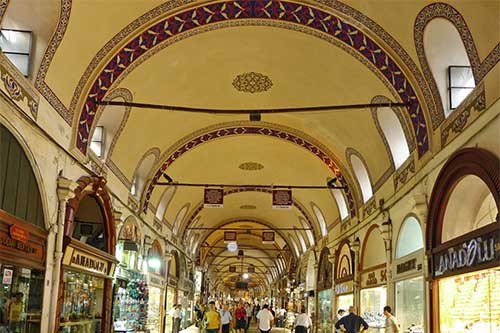More than one writer has observed that entering the modern upscale mall is like stepping into a cathedral. (See most recently, James Smith, Desiring the Kingdom). Large pillars or high arches frame the entryways. Vaulted ceilings with skyward glass or regal rotundas give us a sense of the sublime—a feeling of transcendence. Looking down at the veined marblesque floors, we feel ourselves sliding across antiquity. And the shops—they are like so many quaint chapels where we can taste and see the sacraments of our age. If we are supplicants in these modern cathedrals, coming in search of some Real Presence, we do so as a new breed. We are not worshippers, but consumers. We are homo consumens.
The homo consumens, wrote Psychologist Erich Fromm, is one “whose main interest becomes, aside from working from nine to five, to consume.” His attitude is that of “the eternal suckling” who “with the open mouth . . . consumes everything with voracity — liquor, cigarettes, movies, television, lectures, books, art exhibits, sex; everything is transformed into an article of consumption.” More than 30 years ago (On Disobedience and Other Essays 1981), Fromm’s words may have seemed cynical. Now, it is a way of life. Although we may wince at the label, our life as homo consumens—to the degree that we can afford it–is the new normal.
As a good psychologist, however, Fromm looks at the thing behind the thing, and this is what he sees: “we know that behind this urge to consume there is an inner vacuity — a sense of emptiness. There is, in fact, a sense of depression, a sense of loneliness.” And he knows “there is something very deeply wrong with this.”
Philosophers and cognitive scientists have confirmed that we live much of our lives through “image schemas”—quasi-pictorial representations that fit and make sense of our lived experience, however unconsciously. For instance, TIME as MONEY: we “spend it,” often don’t “have it,” and so can’t “spare it” or “afford it.” Emptiness and fullness also are dual metaphors that seem to capture our lived experience. We might say someone is “full of anger,” “filled with jealously,” or “full of it!” Alternately, an event or incident may “leave us empty” or “hollow.” The loss of a loved one has left a “hole” in our lives. We sometimes feel “drained” or like we “have nothing left to give.”
Of course, many of these metaphors are rooted in our very bodies. In the case of hunger, to be filled feels better for most of us than feeling empty. (Aristotle observed that it is not taste that is pleasurable, but the sensation of swallowing—the anticipation of filling. Otherwise, dieting would be easy; we’d just taste and spit it out!) Emotionally, too, we dread feeling empty and instead long to be filled—with passion, with vision, with love. And this brings us back to Fromm’s concern. That the consumer impulse that we now see as normal is instead a symptom of a deep and increasingly untreated malady that he calls “a sense of loneliness.”
Contemporary psychologists of Attachment Theory tell us that we are at root relational beings. We are hard-wired to connect with others and, while the data is still coming in, the modern versions of connection (social networking, hooking up) do not seem to be filling us up. The symptoms are not just linked to consumer throngs, but can be seen even where noble aspirations and activities substitute for the real presence of relationships.
For Christians familiar with the Bible, this discussion should remind us of the invitations to a filling of presence: be filled with the Spirit (Eph. 5:18), Christ living in me (Gal. 2:20), Jesus’ In them and You in me (John 17:23). And we recognize that our enthusiasm to learn about God or work for Him is not always the same as letting ourselves be filled with Him. Granted, this filling is a mystery, though not much more mysterious than love itself. It cannot always be easily described, although it can be pursued and known—or else there would be no sense in commanding it. And this calling to “be filled”–to let some One’s presence grow in us–is a high calling, for this relational presence is our deepest human need–by design. If we humans don’t follow this invitation to a Person, our emptiness will seek to be filled with some-thing. But then, we will only be left alone with our things.

